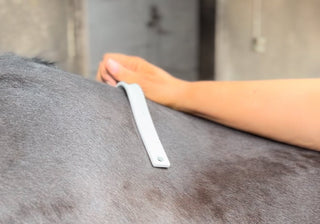Here at Saddles Direct, we pride ourselves on being more than just a network of saddle fitters; we are a community of passionate individuals dedicated to providing you with the best advice and guidance when it comes to taking care of your tack. After all, your saddle is not just a piece of equipment; it's a vital connection between you and your horse, making each ride a truly magical experience.
We've pulled together our top tips on how to look after your saddle. These tips are here to ensure that your saddles remain in prime condition, ensuring the safety and comfort of both you and your horse.
We get it; life can get busy, and it's easy to overlook the care that your saddle deserves. But we want to take the guesswork out of saddle care, so you can focus on what truly matters - spending more time in the saddle.
Our mission is to empower you with the knowledge and confidence to make the best decisions for your horse's well-being. As firm believers in education, we want you to feel empowered, knowing that the professionals you trust have your back (and your saddle!) at all times.
So, let's kick on! Here are five simple steps to follow to take care of your saddle:
1. A correct fit is crucial
Firstly, ensure that any saddle is correctly measured and fitted to both the rider and the horse. The saddle is one of the most important pieces of tack, as it is the item that has as much connection with the horse as it does the rider and when cared for correctly, puts exactly the right amount of pressure on the horse, for optimum horse and rider comfort. If the saddle is not cared for and regularly checked for a good fit, the horse may be prevented from moving freely.
Check out our 5-step saddle fit check but if you're in any doubt, it's better to get checked by a professional so make sure you book a saddle fitting appointment with a qualified saddle fitter.
2. Correct storage is key
Saddle storage is crucial, as saddles can be damaged beyond repair by being stored in a damp or cold environment, in which the leather will perish. Likewise, leather does not react well to being stored in extreme heat, as it dries out and may become brittle. Also, if rodents can get to the saddle, it may be badly chewed so it is advisable to store the saddle in a dry environment, a good height off the ground. Before storing, ensure that the saddle is completely clean and dry. Remember that any water left on metal components can cause rusting and a subsequent weakening of buckles and fastenings.
3. Use a saddle cover
Use a saddle cover, or if this is not possible, use a blanket to cover the saddle whilst not being used, to keep off any damp, dust or mildew and prevent scratches.
4. Check for damage
Leather is affected by moisture, dryness, mould and mildew, therefore a regular inspection of the saddle will help you to spot any leather weaknesses or cracks before they become harmful. All saddle straps, ties and buckles play a crucial role in keeping the rider safe in the saddle and these pieces experience exposure to the elements, as well as wear and tear each time they are used. The most obvious defect is a complete tear, but any piece of leather that has been cracked, frayed or stretched has also been weakened and could snap, so must be repaired or replaced.
5. Regular cleaning
Saddles should be kept clean and supple, how often this should be carried out depends on how frequently the saddle is used and also the types of riding that it is used for. Choose a good quality saddle soap and conditioner and every so often, fully ‘strip down’ the saddle, meaning that every element of the saddle is examined and pockets of dirt and sweat are unable to build up in tight corners, causing the leather to rot. Some of our favourite leather care products are Effax Clear Leather Balm, Effax Clear Leather Grease and the NAF Leather Neatsfoot Oil.
The care of a synthetic saddle is considered minimal and easy when compared to a leather saddle, as they are largely impervious to rain and dirt. However, it is necessary to wipe over a synthetic saddle with a damp cloth to remove any excess dirt. It is also advisable to leave the saddle to dry out if it has become very wet in order to avoid rot and long-term damage, avoiding leaving it in direct sunlight.
We've put together an easy 3-step guide to deep cleaning your saddle, if you're unsure where to start.
We hope you've found our Top Tips for Saddle Care usefrul as a first step into the world of proper saddle maintenance. If you're want more valuable advice and tips, don't forget to join our community on social media. Follow us on Instagram and Facebook for regular updates, expert insights, and product spotlights that will keep you in the loop of all things saddles.
Now, we know that sometimes, no matter how much care and attention we give our beloved saddles, the time might come when you consider an upgrade. As pioneers of the saddle trial, you can have not one, but two saddles to test and decide for yourself which one perfectly complements your riding style and your horse's needs. Take advantage of this unique opportunity and enjoy five full days of riding, testing, and deciding with your saddle fitter which is the perfect fit.
We are the saddle people. Our mission is to ensure that you and your horse feel confident, comfortable, and connected every time you hit the saddle. Together, we'll make sure you and your horse enjoy countless unforgettable rides!




